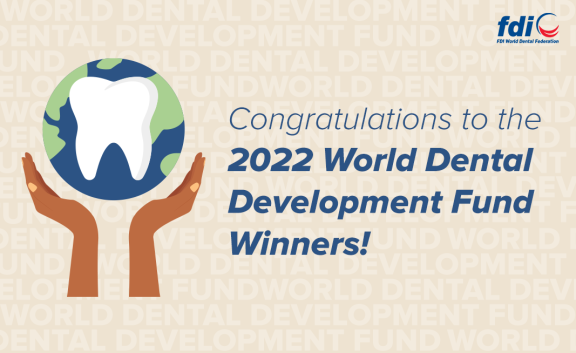Get inspired by our 2022 World Dental Development Fund winners championing oral health
Discover the projects that FDI is supporting through the World Dental Development Fund to support innovative oral health initiatives.

FDI recognizes efforts from Nigeria, India, Kenya and Tanzania to improve oral health in their respective countries through the World Dental Development Fund (WDDF) and awards them US$10,000 each for the development of their projects.
Established in 1999, the WDDF supports innovative oral health initiatives in communities all around the world. The fund backs projects with clear objectives to promote and improve oral health and prevent oral diseases in limited-income areas with oral health needs. Discover all about the 2022 winning projects and get inspired to enhance oral health within your communities.
Upscaling the Whole Mouth Health Advocacy and Capacity Building project based on Vision 2030 for Sugar Control in India
Driven by the Indian Dental Association (IDA), the main goal of this project is to reduce the dietary sugar intake of the Indian population by developing a critical mass of advocates for sugar control in India. This project was developed after FDI conducted the Vision 2030 capacity building workshops jointly with IDA in Mumbai, which led to the development of the Mumbai Declaration on Sugary Drinks and Healthy Food. The secondary goal of this project is to facilitate sugar advocacy in dental colleges in underserved areas of Maharashtra state in India.
Integrating Oral Health Care into Primary Health Care: Training Community Health Workers in Kiambu County-Pilot Programme
The Kenya Dental Association (KDA) is running a pilot programme in Kiambu County, one of the 47 counties of Kenya to train community health volunteers with the main goals to improve Oral Health knowledge among Community Health Volunteers, enhance oral health promotion, and prevention and early detection of oral disease among communities. Addressing such gaps within the community is vital to achieving optimal oral health.
Oral health interventions in nursing mothers to prevent severe early childhood caries in Nigerian children
The winning project of the Nigerian Dental Association is focused on oral health interventions and early childhood caries (ECC). It aims to determine the effect of oral health interventions on the incidence of ECC in Nigerian children aged 2 years, as well as assess ECC occurrence in children after oral health intervention. Another goal of this study is also to evaluate the association between the age of mothers, sex of child, socio-economic status, and presence of caries in mothers and occurrence of ECC.
Common risk factor approach for improving early childhood oral health and malnutrition in preschool children in Kalpetta, India
Another project of the IDA was crowned winner of this year’s WDDF. The project on ‘common risk factor approach for improving early childhood oral health and malnutrition in preschool children’ aims to prevent early childhood caries (ECC) by promoting healthy nutritional practices amongst mothers of young children to improve the quality of life and educational potential of children from birth through their adult years. The programme utilizes an innovative, low-cost, and effective community-based prevention intervention, which includes: education on nutrition and oral hygiene for community health workers, teachers, parents and children; toothbrushes and toothpaste for all 2–3 times per year; and dental exams with referral to dental treatment as needed.
The preliminary results of the intervention have been very promising and there is considerable scope to develop a model for low-cost community-based oral preventive programmes to reduce ECC based on this research outcome.
Kinywa Changu Project
The winning project of the Tanzania Dental Association is aimed at serving children with special healthcare needs aged from 3 to 14 years old, in different schools and special centers in three regions in Tanzania. The project is expected to reach a targeted population of about 3,000 children.
